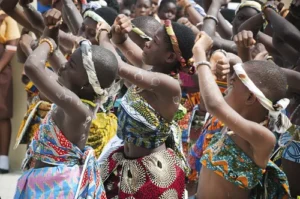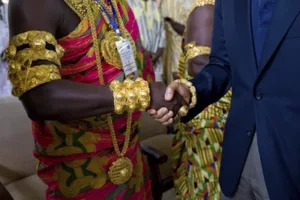Traditional marriage in Ghana is not just the union of the couple and immediate family but the union of groups of people.
The traditional ceremony is a necessary passage rite for all Ghanaian couples. In Ghana today, some couples also perform this alone as a marriage ceremony, while others perform the western wedding in a church with the traditional marriage ceremony.
Also Read: 5 Traditional Unique Igbo Hair Styles You Can Still Adopt
The bride and husband are adorned like royalty in brightly colored fabrics and also decorated with gold jewelry and regalia during the wedding, displaying Ghanaians’ rich culture.
Knocking Ceremony

The groom, on the other hand, informs his family that he has seen a lady whom he wishes to marry. It’s possible that the lady is already known to the family, or that this is their first time hearing about her. With this information, the man’s family proceeds to the “knocking” ceremony (kokooko).
Also Read: The myth of Ahiajoku – originator of the New yam festival
How to Perform the Knocking Ceremony
This “knocking” ceremony is to officially notify the lady’s family of the man’s wish to marry her. The delegation’s speaker would describe their mission in flowery words. “Our noble son here claims he saw a really lovely flower in your garden and would like permission to pluck it.” Such imagery indicates that the groom is ready to do the right thing by requesting the bride’s family for her hand in marriage.
The Groom Family’s Visit to the Bride Family

- The man’s family would take along “tri nsa” (head drinks) – this could be two or three bottles of Schnapps, palm wine or cash.
- If the drinks are accepted by the bride’s family, the bride is asked to give her formal consent to the proposed marriage.
- When she does so, it means the knocking has led to the door opened.
- A date set there for the traditional marriage to take place, or the couple will decide on a date at a later time.
- A marriage or “engagement” list is presented to the groom’s family.
Depending on the family one is marrying into, the list can be short and inexpensive or it can be long and cost-intensive and very daunting. Whichever the case, the groom is expected in a position to provide all the items listed on the marriage list on the marriage day. Some families though, do not also give out lists and rather ask that the groom uses his discretion to provide whatever he is able to, as they do not want to see as ‘selling’ their daughter.
Also Read: Forgotten Igbo gods: A Lost Chapter in Nigerian History
Where Traditional Marriages Takes Place
The traditional marriage takes place at the bride’s home. Where that is not suitable, any other nice venue is chosen.
Exchange of Vows
Traditional marriage is often a whole marital procedure in and of itself. The traditional marriage ceremony or “engagement” is not also the last component of the marriage ceremony for couples who choose to have a white wedding.
For most such couples, the marriage certificate is signed at a church or a state-approved marriage site. Another option is for the couple to go to a court or a marriage registrar to register their marriage under Ordinance. e.
Some Christian couples who also decide not to have a white wedding opt for a priest/pastor being at the ceremony to pray over the rings and the marriage. This is also referred to as “blessing”. For those not of the Christian faith, the “blessing” can be done away with.
The bride and groom also go round to greet their guests and thank them for being a part of their day.








